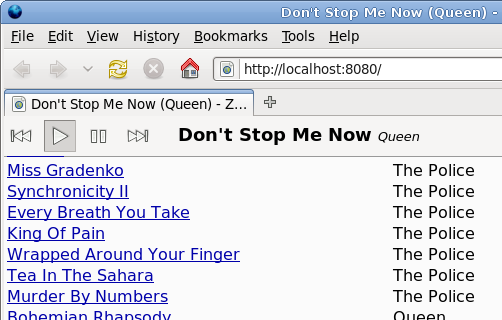I love SSH. One reason is that I love being able to get to my files from anywhere on the planet without any advance planning.
After using SSH for a while, carrying my bits around with me on magnetized platters or EEPROMs inside a laptop/phone/PMP just seems so quaint and irritating. It leads to a host of problems: you have to worry about synchronizing, deciding what to synchronize, merging changes, and misplacing your device. Usually, some bizarre cable is involved in transferring data. And invariably, there's that one spreadsheet, paper, song, or ebook that you tragically can't view because you left it on your computer at home.
(Incidentally, I think using cloud hosted storage/apps is one approach, but not a complete solution, at least yet.)
Introducing Zeya
While SSH is great for the vast majority of application classes, I think effectively accessing audio/video remotely requires more specialized tools.
To this end, I spent a few days writing Zeya, a music server that takes your Rhythmbox music collection and streams songs from it to you. However, unlike gnump3d or ampache, Zeya presents a full music player right in your web browser, using the goodness of HTML 5. No Flash, no Silverlight, no Java applets, no plugins, no popups, no invoking external players, no client-side software installation.
Zeya brings your music to any computer with a web browser (OK, as long as the browser is Firefox 3.5, for the moment). Play songs from your collection on your desktop at work. Or on your netbook at Starbucks. And now or soon, when you get a current-gen web browser on your phone/MID/fridge, you can bring all your music there too.
Picture iTunes' library sharing. Now imagine that its functionality wasn't crippled to lock users in to iTunes. Oh, and you could actually access it from outside your LAN. Oh, and that you could listen from any computer, anywhere, without installing any software. I think Zeya in its current state is just a pale shadow of what is really possible when you actually try to make information really easy, rather than just marginally less difficult, to get to.
Samson Yeung and I have been working on, and using, Zeya for a few days now. It's pretty useful and easy to get running, but it is feature-bare, experimental, and subject to change in all sorts of fun and interesting ways. If that doesn't scare you, visit
try it out, and let me know what you think.
